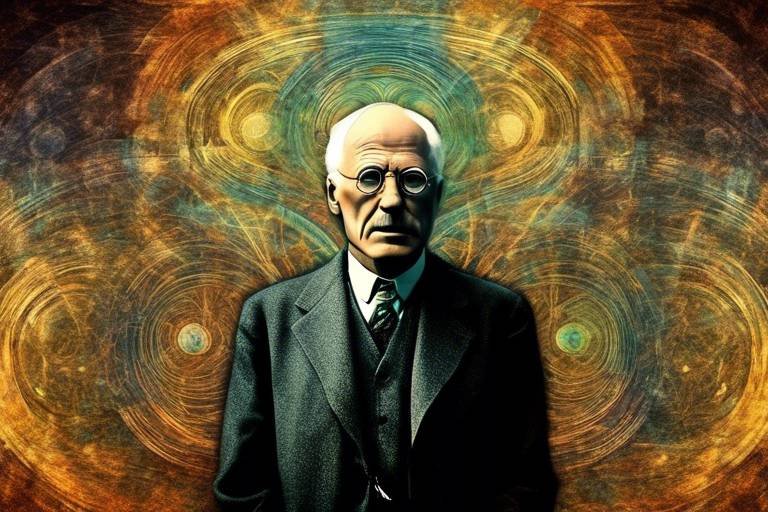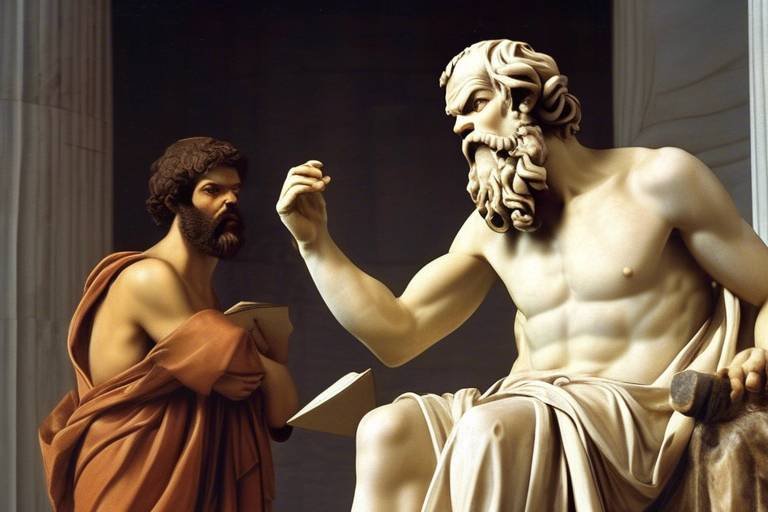Explaining the Philosophical Roots of Marxism
Marxism is often perceived as a mere political ideology, but its roots delve deep into a rich tapestry of philosophical concepts that emerged during a tumultuous period in history. To truly grasp what Marxism represents, one must understand the intricate web of ideas that influenced Karl Marx and Friedrich Engels as they formulated their theories. The 19th century was a time of profound change, marked by the Industrial Revolution, which not only transformed economies but also the very fabric of society. This article aims to unravel the philosophical underpinnings of Marxism, shedding light on its historical context, key thinkers, and the implications for social and economic theories that continue to resonate today.
The socio-political landscape of the 19th century was a melting pot of class struggles, industrial advancements, and philosophical debates. As the world transitioned from agrarian societies to industrial powerhouses, a new class structure emerged. The rise of the bourgeoisie, or the capitalist class, was met with the burgeoning proletariat, the working class. This dynamic created a fertile ground for the ideas that would later be crystallized in Marxist thought. Understanding this context is crucial; it was not merely an academic pursuit for Marx and Engels, but a response to the lived realities of their time. The struggles faced by workers, the exploitation inherent in capitalist systems, and the philosophical inquiries into human nature and society all converged to shape their revolutionary ideas.
In addition to the socio-political elements, the philosophical influences on Marxism are profound and varied. Thinkers like Georg Wilhelm Friedrich Hegel and Ludwig Feuerbach provided critical frameworks that Marx would adapt and critique. Hegel's dialectical method, which emphasized the process of thesis, antithesis, and synthesis, became a cornerstone for Marx's understanding of historical development. However, Marx turned Hegel's idealism on its head, proposing instead a materialist conception of history that emphasized the material conditions of life as the driving force of societal change. This shift from idealism to materialism is one of the most significant philosophical transformations in Marxist theory.
Furthermore, Marx's engagement with Feuerbach's critique of religion and focus on humanism cannot be overlooked. Feuerbach's assertion that human beings are the center of their own existence resonated with Marx, who expanded this idea into a broader critique of alienation within capitalist societies. Marx argued that under capitalism, individuals become estranged from their labor, their fellow workers, and ultimately, their own humanity. This notion of alienation is pivotal, as it highlights the psychological and social ramifications of economic systems, making the case for a revolutionary change to reclaim human dignity and agency.
As we explore the philosophical roots of Marxism, it becomes clear that it is not just a critique of capitalism but a comprehensive framework for understanding the complexities of human society. The interplay between historical materialism and class struggle forms the backbone of Marxist thought, providing a lens through which to analyze the past, present, and future of social relations. In the following sections, we will delve deeper into these themes, examining the implications of class struggle and the revolutionary potential that Marx envisioned. Are you ready to embark on this intellectual journey through the philosophical landscape that birthed one of the most influential ideologies of our time?
- What is the main idea behind Marxism?
Marxism primarily critiques capitalism and advocates for a classless society where the means of production are communally owned.
- Who were the key figures in the development of Marxist thought?
Karl Marx and Friedrich Engels are the most prominent figures, but they were influenced by earlier philosophers like Hegel and Feuerbach.
- How does Marxism view history?
Marxism posits that history is driven by material conditions and class struggles, leading to societal evolution and change.

Historical Context of Marxism
To truly understand Marxism, one must first appreciate the tumultuous socio-political landscape of the 19th century. This was a time of significant upheaval, characterized by the Industrial Revolution, which drastically transformed economies and societies across Europe. Factories sprung up, cities swelled with workers seeking employment, and the age-old agrarian lifestyle began to fade into the background. But with this transformation came a host of challenges, notably the rise of class struggles that would later become central to Marxist theory.
The Industrial Revolution was not just about new technologies; it was a catalyst for social change. As people flocked to urban centers, they found themselves in a world dominated by industrial capitalists—the bourgeoisie—who wielded immense power and wealth. Meanwhile, the working class—the proletariat—faced long hours, low wages, and perilous working conditions. The stark contrast between these two classes created a fertile ground for conflict, setting the stage for Marx’s revolutionary ideas.
In addition to the economic transformations, earlier philosophical movements played a crucial role in shaping Marx's thoughts. The Enlightenment had already begun to challenge traditional authority, promoting ideas of reason, individualism, and skepticism towards established institutions. Thinkers like Immanuel Kant and Georg Wilhelm Friedrich Hegel questioned the nature of reality and existence, paving the way for Marx to develop his critiques of society. Hegel’s dialectical method, in particular, would become a foundational element in Marx's approach to understanding historical progress and class struggle.
Moreover, the political landscape during this period was rife with revolutions and uprisings. The French Revolution of 1789, for instance, ignited discussions about liberty, equality, and fraternity, challenging the feudal structures that had dominated Europe for centuries. Such events not only inspired Marx but also illustrated the potential for social upheaval when the oppressed rise against their oppressors. It was this spirit of revolt and the quest for a more equitable society that Marx sought to harness and articulate through his theories.
As we delve deeper into the philosophical influences that shaped Marxism, it becomes evident that understanding the historical context is not merely academic; it is essential for grasping the core of Marx's critique of capitalism. The interplay between economic conditions, philosophical thought, and revolutionary fervor created a unique environment that allowed Marxism to emerge as a powerful critique of the inequalities inherent in capitalist society.
In summary, the historical context of Marxism can be encapsulated in a few key points:
- The Industrial Revolution transformed economies and societies, leading to class struggles.
- Philosophical movements of the Enlightenment challenged traditional authority and established norms.
- Political revolutions, like the French Revolution, inspired thoughts of equality and social justice.
- The interplay of these factors created a fertile ground for Marx's revolutionary ideas.

Key Philosophical Influences
When diving into the rich tapestry of Marxism, it’s impossible to overlook the profound philosophical influences that shaped its core tenets. At the heart of Marxist theory lie the ideas of several key thinkers whose contributions laid the groundwork for Karl Marx's revolutionary thoughts. One cannot fully appreciate Marxism without understanding the philosophical currents of the time, particularly those stemming from Georg Wilhelm Friedrich Hegel and Ludwig Feuerbach. These thinkers not only influenced Marx's methodology but also provided a critical lens through which he viewed society and history.
To start, Hegel's dialectical method was a significant stepping stone for Marx. Hegel proposed that the development of ideas and history occurs through a process of thesis, antithesis, and synthesis. This dialectical approach, which emphasizes conflict and resolution, resonated with Marx, who adapted it to his own materialist conception of history. Rather than focusing on the evolution of ideas, Marx redirected this dialectic towards the material conditions of life, arguing that the economic base of society fundamentally shapes its superstructure, including politics, culture, and ideology.
In contrast to Hegel’s idealism, which posits that reality is driven by ideas, Marx championed a materialist perspective. This distinction is crucial; while Hegel believed that the evolution of consciousness drives historical change, Marx asserted that material conditions—such as labor and production—are the true engines of societal development. This shift from idealism to materialism is not just a minor tweak; it represents a fundamental rethinking of how we understand history and society.
Another pivotal figure in Marx's intellectual journey was Ludwig Feuerbach, whose critiques of religion and emphasis on humanism left a lasting mark. Feuerbach argued that religion is a projection of human qualities onto a divine figure, which leads to alienation from our true essence. This idea of alienation deeply influenced Marx's understanding of human nature and the effects of capitalism. Marx took Feuerbach's ideas and applied them to the realm of labor, suggesting that under capitalism, workers become alienated not only from the products of their labor but also from their own human potential.
In summary, the philosophical influences on Marxism are both profound and complex. Hegel’s dialectical method provided a framework for understanding change, while Feuerbach’s critique of religion and focus on humanism shaped Marx’s views on alienation and societal structures. Together, these thinkers contributed to a revolutionary framework that challenges us to rethink the relationship between material conditions and human development.
- What is the main difference between Hegel's idealism and Marx's materialism?
Hegel's idealism posits that ideas drive historical change, while Marx's materialism asserts that material conditions shape society and history. - How did Feuerbach influence Marx's views on religion?
Feuerbach's critique of religion as a projection of human qualities helped Marx understand the concept of alienation, particularly how capitalism alienates workers from their labor. - What role does dialectics play in Marxism?
Dialectics in Marxism emphasizes the conflict and resolution between opposing forces, particularly in terms of class struggles and societal change.

Hegelian Dialectics
When we dive into the world of , we enter a fascinating realm where ideas clash, evolve, and ultimately lead to new understandings. Imagine a conversation where each participant presents their view, and through the back-and-forth of dialogue, a richer, more nuanced perspective emerges. This is the essence of Hegel's dialectical method, which Marx adopted and adapted to fit his own revolutionary framework. At its core, dialectics is about the interplay between opposites, a dynamic process that can be distilled into three stages: thesis, antithesis, and synthesis.
To put it simply, the thesis represents an initial idea or state of affairs. The antithesis, on the other hand, is the contradiction or challenge to that thesis. This conflict ignites a process where both ideas engage in a struggle, leading to a synthesis that transcends and reconciles the initial opposition. Think of it like a dance: two partners (the thesis and antithesis) move together in a complex rhythm, and through their interaction, they create a new form of movement (the synthesis) that incorporates elements of both.
Marx took Hegel's abstract notions and grounded them in the material world. He believed that instead of ideas driving the evolution of society, it was the material conditions—like economic structures and class relations—that formed the basis of historical development. This shift from Hegel’s idealism to Marx’s materialism is crucial; it’s like changing the lens through which we view a landscape. Instead of focusing on the clouds (ideas), Marx directed our attention to the earth beneath our feet (material conditions) and how it shapes our existence.
In this way, Marx’s adaptation of Hegelian dialectics led to the development of what he termed historical materialism. This concept posits that the economic base of society—its productive forces and relations—determines the superstructure, which includes culture, politics, and ideology. Thus, when we analyze historical developments, we must consider the underlying economic factors that drive societal change. For instance, the rise of capitalism didn't just happen in a vacuum; it was a response to the contradictions and conflicts inherent in feudal society, showcasing the dialectical process in action.
Ultimately, Hegelian dialectics serves as a powerful tool for understanding the complexities of human history and social evolution. It teaches us that change is not linear but rather a dynamic and often tumultuous process filled with contradictions. By embracing this view, we can better appreciate the struggles and triumphs that shape our world. So, the next time you find yourself grappling with conflicting ideas or societal tensions, remember the dance of dialectics—it's all part of the grand narrative of human progress.

Materialism vs. Idealism
When diving into the philosophical depths of Marxism, one cannot overlook the **crucial distinction** between materialism and idealism. At its core, this contrast shapes the very foundation of Marxist thought and its critique of society. Materialism posits that the material conditions of life—such as economic factors, social relations, and tangible realities—are the primary influences on human behavior and societal development. In contrast, idealism suggests that ideas, consciousness, and spiritual factors drive human history and social change. You might wonder, how did these opposing views come to define such different paths in philosophy?
To understand this, let’s take a closer look at how Marx and his predecessors viewed the world. Hegel, a towering figure in idealism, believed that reality is shaped by the evolution of ideas through a dialectical process. He argued that the development of human consciousness is what propels history forward. This perspective, while profound, places human thought at the center of historical development, creating a narrative where ideas precede material conditions. For Hegel, the thesis (an initial idea) generates an antithesis (a conflicting idea), leading to a synthesis (a new idea), which becomes the new thesis, and the cycle continues.
Marx, however, took a different route. He flipped Hegel’s idealism on its head, advocating for a materialist conception of history. Instead of ideas shaping reality, Marx argued that it is the material conditions—the way people produce and reproduce their lives—that ultimately shape their consciousness. This shift is monumental: it means that to understand society, we must first understand its economic base. In this light, materialism becomes a lens through which we can analyze the structures of power, class relations, and economic systems.
Consider this analogy: if we think of society as a tree, materialism would focus on the roots—the economic and social conditions that nourish and support the tree—while idealism would look at the leaves and branches, emphasizing the ideas and beliefs that grow from those roots. Without strong roots, the tree cannot thrive, regardless of how beautiful its leaves may be. This metaphor illustrates the importance of grounding our understanding of society in material conditions rather than abstract ideals.
Furthermore, Marx’s materialism leads to a profound understanding of alienation. In a capitalist society, workers become alienated from the products of their labor, the labor process itself, their fellow workers, and ultimately from their own human potential. This alienation stems from the material conditions of capitalism, where the means of production are owned by a small bourgeoisie, while the proletariat, or working class, is left to sell their labor for survival. In this sense, Marx’s materialism is not just a theory; it is a practical tool for understanding and critiquing the inequalities of the capitalist system.
In summary, the debate between materialism and idealism is not merely academic; it has real-world implications for how we understand society and its evolution. By adopting a materialist perspective, Marx provides a framework for analyzing the dynamics of class struggle, economic systems, and social change. This approach challenges us to look beyond lofty ideals and to focus on the tangible realities that shape our lives. So, as we explore the philosophical roots of Marxism, it becomes clear that understanding materialism vs. idealism is essential for grasping the complexities of historical and social development.
- What is materialism in Marxism? Materialism in Marxism refers to the belief that material conditions and economic factors are the primary influences on societal development and human behavior.
- How does materialism differ from idealism? Materialism focuses on the tangible aspects of society, such as economy and class relations, while idealism emphasizes the role of ideas and consciousness in shaping history.
- Why is the concept of alienation important in Marxist theory? Alienation describes the disconnection workers feel from the products of their labor and their own humanity in a capitalist system, highlighting the negative effects of economic exploitation.

Historical Materialism
Historical materialism is a fundamental concept that serves as the backbone of Marxist theory, providing a framework for understanding the development of human societies. At its core, historical materialism posits that the material conditions of a society—such as its economic structure, technology, and resources—are the primary drivers of social change and historical progression. This perspective contrasts sharply with idealist philosophies that prioritize ideas and consciousness as the main catalysts for change. By focusing on the tangible aspects of life, Marx aimed to uncover how economic factors shape social relations and institutions.
To understand historical materialism, it’s essential to recognize its roots in Marx's critique of the idealist philosophy of his time, particularly that of Hegel. While Hegel focused on the evolution of ideas, Marx flipped the script, arguing that it is the material world that shapes human thought. In this way, Marx introduced a revolutionary approach to history, one that emphasized the importance of class relations and economic power dynamics. For Marx, the material conditions of society—determined by modes of production—dictate the cultural, political, and ideological superstructure that emerges from them.
One of the key aspects of historical materialism is its focus on the relationship between the forces of production (the means and methods by which goods are produced) and the relations of production (the social relationships that people enter into as they produce goods). This relationship is crucial for understanding how societies evolve over time. As the forces of production develop—through technological advancements, for example—so too do the relations of production. This evolving relationship can lead to conflicts and contradictions within society, ultimately resulting in revolutionary changes.
To illustrate this concept, consider the following table that summarizes the relationship between forces and relations of production:
| Forces of Production | Relations of Production |
|---|---|
| Labor | Class relations (e.g., employer-employee) |
| Technological tools and methods | Ownership structures (e.g., private vs. collective ownership) |
| Raw materials | Social roles and hierarchies |
Through historical materialism, Marx sought to explain how societal changes often stem from conflicts between different classes, particularly during times of economic upheaval. For instance, the transition from feudalism to capitalism was not merely a shift in economic systems; it was a profound transformation that involved the rise of the bourgeoisie (the capitalist class) and the corresponding decline of the feudal lords. This shift was marked by class struggles that reflected the underlying economic tensions. Marx believed that such struggles are not just historical curiosities but are central to understanding the trajectory of human societies.
Furthermore, historical materialism provides a lens through which we can analyze contemporary social issues. By examining how current economic conditions influence class relations and societal structures, we can better understand the roots of modern social conflicts. For example, the rise of gig economies and precarious labor conditions today can be analyzed through the historical materialist framework, highlighting how shifts in production methods affect workers' rights and social relations.
In summary, historical materialism is more than just a theoretical construct; it is a powerful tool for dissecting the complexities of human history and social change. By focusing on the material conditions of life, Marx offers a lens that reveals the intricate relationship between economic structures and social dynamics, making it a cornerstone of Marxist thought.
- What is historical materialism?
Historical materialism is a Marxist framework that emphasizes the role of material conditions in shaping social structures and historical development. - How does historical materialism differ from idealism?
While idealism prioritizes ideas and consciousness as drivers of change, historical materialism focuses on material conditions and economic factors. - Why is class struggle important in historical materialism?
Class struggle is viewed as a key driver of historical change, reflecting the conflicts between different economic classes as they navigate the material conditions of their society.

Feuerbach's Influence
Ludwig Feuerbach, a pivotal figure in the philosophical landscape of the 19th century, played a significant role in shaping Karl Marx's ideas. Feuerbach's critique of religion and emphasis on humanism provided a fresh lens through which Marx could analyze society and human nature. In a world where religion often obscured the material conditions of life, Feuerbach stripped away the divine facade, arguing that the essence of humanity lies in its material existence and social relations. This perspective was revolutionary, as it redirected focus from abstract ideals to the tangible realities of human life.
One of Feuerbach's key contributions was his assertion that religion is a projection of human traits and desires. He famously stated, "Man is what he eats," emphasizing the idea that our material conditions directly influence our consciousness and identity. This notion resonated deeply with Marx, who would later argue that it is not consciousness that determines life, but rather social being. By acknowledging the importance of material conditions, Feuerbach laid the groundwork for Marx's materialist conception of history.
Feuerbach's humanism also highlighted the concept of alienation, a theme that would become central in Marx's critique of capitalism. Feuerbach argued that religion alienates individuals from their true essence by placing divine attributes outside of human reach. Marx took this idea further, positing that under capitalism, workers become alienated not only from their labor but also from their own humanity. This alienation arises because the products of their labor are owned by the bourgeoisie, creating a disconnect between the worker and the fruits of their work. In this sense, Feuerbach's influence can be seen as a catalyst for Marx's exploration of human alienation in a capitalist society.
Moreover, Feuerbach's emphasis on the importance of human relationships and social context influenced Marx's understanding of societal development. By focusing on human beings as social creatures, Feuerbach encouraged a shift away from individualism towards a more collective perspective. This shift was crucial for Marx, who viewed the struggle for emancipation as a collective endeavor rather than an individual pursuit. In essence, Feuerbach's ideas helped Marx to formulate a vision of a society where human beings could reclaim their essence through collective action and solidarity.
In summary, Feuerbach's critique of religion and his focus on humanism were instrumental in shaping Marx's thought. By challenging the idealist notions that dominated philosophical discourse, Feuerbach opened the door for a materialist analysis of society. His ideas about alienation and the importance of social relationships provided Marx with the conceptual tools necessary to critique capitalism and envision a more equitable world. As we delve deeper into Marxism, it becomes clear that understanding Feuerbach's influence is essential for grasping the complexities of Marxist theory and its implications for social change.
- Who was Ludwig Feuerbach?
Feuerbach was a German philosopher known for his critique of religion and his emphasis on humanism, which significantly influenced Karl Marx's ideas. - How did Feuerbach influence Marx's ideas on alienation?
Feuerbach's concept of alienation in religion inspired Marx to explore how capitalism alienates workers from their labor and humanity. - What is the significance of materialism in Marxism?
Materialism is central to Marxism as it emphasizes that material conditions shape human consciousness and societal development, contrasting with idealist philosophies.

Class Struggle as a Central Theme
The concept of class struggle is not merely an abstract idea in Marxism; it is the very engine that drives historical development and societal change. At its core, Marxism posits that history is a record of the conflicts between different social classes, primarily the proletariat (working class) and the bourgeoisie (capitalist class). This struggle is rooted in the economic conditions of society and manifests in various forms, from peaceful negotiations to violent revolutions. But why is this struggle so central to Marxist thought? Well, it’s simple: Marx believed that the inherent contradictions within capitalist societies would eventually lead to a breaking point, sparking a revolutionary wave that would reshape the social order.
Marx viewed class struggle as the driving force behind historical progress. He argued that as the bourgeoisie amassed wealth and power, they simultaneously created the conditions for their own downfall. The more they exploited the proletariat, the more discontent brewed among the working class. This discontent is crucial; it acts as a catalyst for change. Think of it like a pressure cooker—eventually, the steam has to escape, and when it does, it can lead to explosive results. In this sense, class struggle is not just a battle for economic resources but a fundamental aspect of human development.
To better understand this dynamic, consider the following table that outlines the key characteristics of the two primary classes in Marxist theory:
| Class | Characteristics | Role in Society |
|---|---|---|
| Proletariat | Workers, wage laborers, lack ownership of production | Exploited for labor, seeking better conditions |
| Bourgeoisie | Capitalists, owners of production, control resources | Exploits labor for profit, maintains power |
In Marxist theory, the relationship between the proletariat and the bourgeoisie is inherently antagonistic. The bourgeoisie benefits from the labor of the proletariat while simultaneously oppressing them. This exploitation creates a cycle of conflict that is both economic and social. The proletariat's struggle against the bourgeoisie is not just about wages or working conditions; it is about reclaiming their humanity, dignity, and power. This struggle is deeply tied to the concept of alienation, where workers feel disconnected from the products of their labor, their fellow workers, and their own humanity.
Marx’s analysis leads to the idea that the proletariat is not just a passive victim but has the potential to become a revolutionary force. As awareness of their exploitation grows, the proletariat can unite and rise against the bourgeoisie. This potential for revolution is what Marx believed would ultimately lead to the establishment of a classless society, where the means of production are communally owned, and exploitation is eliminated. It is a vision of a world where freedom and equality are not just ideals but realities.
In conclusion, class struggle is more than a theoretical concept in Marxism; it is a vital framework for understanding the dynamics of power and oppression in society. It reveals how economic inequalities shape human relationships and societal structures. By recognizing the importance of class struggle, we can better grasp the complexities of our own social context and the ongoing relevance of Marxist thought in contemporary discussions about inequality and justice.
- What is class struggle?
Class struggle refers to the conflict between different classes in society, particularly between the working class (proletariat) and the owning class (bourgeoisie). - Why is class struggle important in Marxism?
It is seen as the driving force behind historical change and social evolution, leading ultimately to revolutionary transformations in society. - How does class struggle manifest?
It can manifest in various ways, including strikes, protests, and revolutions, as well as through more subtle forms of resistance and negotiation.

Proletariat vs. Bourgeoisie
The relationship between the proletariat and the bourgeoisie is pivotal in Marxist theory, serving as the backbone of Marx's analysis of capitalist societies. At its core, this dynamic highlights a fundamental conflict between two classes: the proletariat, or the working class, who sell their labor to survive, and the bourgeoisie, the capitalist class, who own the means of production and derive profit from the labor of others. This class struggle is not merely a historical footnote; it is a living, breathing reality that shapes our social and economic landscapes today.
To understand this relationship better, let's break it down:
| Class | Definition | Role in Society |
|---|---|---|
| Proletariat | The working class who do not own production means and must sell their labor. | Labor force that fuels the economy but often faces exploitation and alienation. |
| Bourgeoisie | The capitalist class who own the means of production and control wealth. | Decision-makers who profit from labor, often perpetuating social inequality. |
Marx argued that the bourgeoisie exploits the proletariat, creating a system where the wealth generated by workers is siphoned off into the hands of a few. This exploitation manifests in various ways, such as low wages, poor working conditions, and a lack of job security. As the bourgeoisie accumulates wealth, the proletariat becomes increasingly alienated from the products of their labor, leading to what Marx referred to as alienation. This concept is essential to understanding the psychological and social ramifications of class struggle.
Moreover, Marx believed that the inherent conflict between these two classes would ultimately lead to revolutionary change. The proletariat, recognizing their exploitation and uniting against the bourgeoisie, would rise to challenge the status quo. This revolutionary potential is not just a theoretical concept; it is a call to action that has inspired countless movements throughout history. The idea is that when the proletariat understands their collective strength, they can overthrow the bourgeoisie, dismantling the capitalist structures that oppress them.
In essence, the struggle between the proletariat and bourgeoisie is not just about economics; it is a deep-seated battle for dignity, agency, and a fair share of the wealth produced by society. As we look at today’s world, with its growing wealth disparities and social injustices, the relevance of this class conflict is more apparent than ever. The question remains: will the proletariat awaken to their power, or will the bourgeoisie continue to dominate?
- What is the main difference between the proletariat and bourgeoisie?
The proletariat is the working class that sells their labor, while the bourgeoisie is the capitalist class that owns the means of production. - How does class struggle manifest in modern society?
Class struggle can be seen in wage disparities, labor rights movements, and social justice campaigns that seek to address inequality. - What role does alienation play in Marxist theory?
Alienation refers to the disconnection workers feel from the products of their labor, often leading to a lack of fulfillment and identity in their work. - Can the proletariat truly unite against the bourgeoisie?
While challenges exist, historical movements show that collective action can lead to significant social and economic changes.

Revolutionary Potential
Marx's vision of the world was not just a critique of existing conditions; it was a clarion call for revolutionary change. He believed that the inherent conflicts within capitalism would inevitably lead to a revolutionary upheaval. This idea wasn't just a passing thought for Marx; it was a central tenet of his philosophy. The proletariat, or working class, was seen as the driving force that would rise against the bourgeoisie, or capitalist class, igniting a transformation that would reshape society.
To understand Marx's revolutionary potential, one must first grasp the conditions that he argued would lead to such an uprising. He posited that as the capitalist mode of production advanced, the divide between the rich and the poor would widen, creating a situation ripe for conflict. The proletariat, increasingly aware of their exploitation, would develop a class consciousness, recognizing their collective power. This awakening was crucial; it meant that the working class would no longer see themselves as isolated individuals but as part of a larger movement striving for justice.
Marx was not naive; he understood that revolutions are complex and fraught with challenges. He recognized that the ruling class would not relinquish power without a fight. Thus, the revolutionary potential of the proletariat was not merely a theoretical concept but a practical necessity for achieving a classless society. He famously stated that “the history of all hitherto existing society is the history of class struggles,” emphasizing that the struggle itself is a catalyst for social change.
In examining the revolutionary potential, one might ask: what does this mean in practice? Marx believed that the proletariat would unite, overthrow the bourgeoisie, and dismantle the structures of oppression. This revolutionary act would not only liberate the working class but would also pave the way for a new social order based on collective ownership and equitable distribution of resources. The vision was not just about seizing power; it was about transforming the very fabric of society.
However, the path to revolution is fraught with obstacles. The state, as an apparatus of the ruling class, would likely attempt to suppress any movements towards change. This is where Marx's ideas about the role of political action come into play. He believed that the proletariat must organize, educate, and mobilize to challenge the status quo. The revolutionary potential lies not just in the act of revolt but in the conscious, organized efforts of the working class to bring about systemic change.
In conclusion, the revolutionary potential within Marxism is a dynamic and multifaceted concept. It encapsulates the struggles, aspirations, and collective will of the proletariat to overthrow an oppressive system. As we reflect on Marx's ideas today, we can see that the call for revolution is not merely historical but resonates in contemporary struggles for social justice and equality. The question remains: will the lessons of the past inspire future generations to seize their revolutionary potential?
- What is the main idea behind Marx's revolutionary potential?
Marx's revolutionary potential centers on the belief that the proletariat will rise against the bourgeoisie due to class struggles, leading to a transformation of society.
- How does class consciousness play a role in revolution?
Class consciousness allows the proletariat to recognize their collective power and unite for a common cause, which is essential for initiating revolutionary change.
- What challenges do revolutions face according to Marx?
Marx acknowledged that revolutions face significant challenges, particularly from the ruling class, which will resist losing power and may use state mechanisms to suppress uprisings.
- Is Marx's concept of revolution relevant today?
Yes, Marx's ideas about revolution continue to resonate in contemporary movements for social justice, equality, and systemic change.
Frequently Asked Questions
- What are the main philosophical roots of Marxism?
Marxism is primarily rooted in the ideas of historical materialism, Hegelian dialectics, and the critiques of religion and humanism presented by Ludwig Feuerbach. These philosophical foundations help shape Marx's understanding of class struggle, societal development, and the dynamics of capitalism.
- How did the industrial revolution influence Marxism?
The industrial revolution played a pivotal role in the emergence of Marxism by creating stark class divisions and highlighting the struggles between the working class (proletariat) and the owning class (bourgeoisie). This socio-political landscape provided the backdrop for Marx's analysis of capitalism and class conflict.
- What is historical materialism?
Historical materialism is a key concept in Marxist theory that posits that material conditions and economic factors are the primary influences on societal development and historical change. Marx applied this framework to analyze how class structures evolve over time based on these material realities.
- How does Hegelian dialectics relate to Marxism?
Hegelian dialectics, with its focus on the process of thesis, antithesis, and synthesis, significantly influenced Marx's approach to understanding history. Marx adapted these ideas to develop his materialist conception of history, emphasizing the role of material conditions in shaping societal change.
- What role does class struggle play in Marxism?
Class struggle is central to Marxist theory, as it is viewed as the driving force behind historical change and societal evolution. Marx believed that the conflict between the proletariat and bourgeoisie would ultimately lead to revolutionary transformations and the establishment of a classless society.
- Who are some key thinkers that influenced Marx?
Aside from Hegel and Feuerbach, other influential thinkers include Adam Smith and Karl Rodbertus, whose ideas about economics and social theory also contributed to Marx's development of his own theories. Each of these philosophers provided insights that helped shape Marx's critique of capitalism.
- What is the significance of the proletariat in Marxism?
The proletariat, or working class, is seen as the revolutionary class in Marxism. Marx believed that the proletariat would rise against the bourgeoisie, leading to a transformation of society and the eventual establishment of socialism, where the means of production would be collectively owned.
- How does Marxism address the concept of alienation?
Marxism addresses alienation through the lens of labor and capitalism. Marx argued that workers become alienated from their labor, the products they create, and their fellow workers due to the exploitative nature of capitalist production. This alienation is a critical aspect of his critique of capitalism.



















